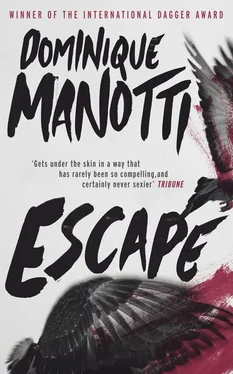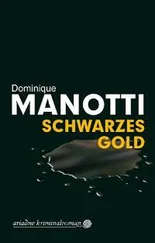Dominique Manotti - Escape
Здесь есть возможность читать онлайн «Dominique Manotti - Escape» весь текст электронной книги совершенно бесплатно (целиком полную версию без сокращений). В некоторых случаях можно слушать аудио, скачать через торрент в формате fb2 и присутствует краткое содержание. Год выпуска: 2014, ISBN: 2014, Издательство: Arcadia Books Limited, Жанр: Криминальный детектив, на английском языке. Описание произведения, (предисловие) а так же отзывы посетителей доступны на портале библиотеки ЛибКат.
- Название:Escape
- Автор:
- Издательство:Arcadia Books Limited
- Жанр:
- Год:2014
- ISBN:9781909807747
- Рейтинг книги:4 / 5. Голосов: 1
-
Избранное:Добавить в избранное
- Отзывы:
-
Ваша оценка:
- 80
- 1
- 2
- 3
- 4
- 5
Escape: краткое содержание, описание и аннотация
Предлагаем к чтению аннотацию, описание, краткое содержание или предисловие (зависит от того, что написал сам автор книги «Escape»). Если вы не нашли необходимую информацию о книге — напишите в комментариях, мы постараемся отыскать её.
Escape — читать онлайн бесплатно полную книгу (весь текст) целиком
Ниже представлен текст книги, разбитый по страницам. Система сохранения места последней прочитанной страницы, позволяет с удобством читать онлайн бесплатно книгу «Escape», без необходимости каждый раз заново искать на чём Вы остановились. Поставьте закладку, и сможете в любой момент перейти на страницу, на которой закончили чтение.
Интервал:
Закладка:
‘Never. You’re talking as if you don’t know how the government works. They hate us because we exposed their rotten schemes and we frightened them, really frightened them. They found out that perhaps they were mortal. Now that they’ve won, they’re going to make us pay for it, they’re taking their revenge and will continue to do so, there’ll never be an amnesty, they’ll let us rot in jail or in exile until the end of time…’
‘It’s not possible, Carlo, there are still some democrats in Italy…’
‘Don’t be naive. Are you aware of how many emergency laws they’ve introduced, how many of our people are in jail? Five thousand? More? You’ve seen the new law on dissociation? First the penitenti , those turned informants, then those who’ve formally repented. Just you wait, there’ll be havoc, we’re going to wither on the vine. Everything will fall apart, they’ll do their utmost to wipe us out, one by one. Our politicians, pseudo-democrats included, are pathetic, incompetent and vindictive.’
‘Maybe. But does that improve your chances of survival?’
‘At least I’ll have tried. I don’t want to give them the satisfaction of seeing me die in jail. I do not repent, I do not dissociate myself from the movement, I renounce nothing, and I’m appalled by those who do, but fuck them, fuck those who’ve won. I’ll get hold of some money and an ID — taking as few risks as possible — and I’m out of here. I’ll go and live abroad, in the open.’
‘I’ve been worried ever since they transferred you to that prison for common criminals, six months ago. I thought there was something odd about that. I’m afraid of a trap. And now your cellmate…’
‘Don’t be paranoid, Lisa.’
‘Am I naive or am I para?’
‘Both. Don’t worry. My cellmate and I have already parted company.’
‘What about the accomplices they mention in the papers?’
‘The truck drivers. They’re not politicos, but small-time crooks. They were paid, they’re protected and they know nothing. My two current companions aren’t politicos either and I’m certain of them. Lisa, give me time to find the money and get my ID sorted, it’s all been planned, organised, it won’t be hard, I won’t put myself in danger, and then I’ll go abroad. I’ll call you and you can come and join me. My next call will be the beginning of our new life. I love you, Lisa…’
‘Stop. Be quiet. It’s too painful. I’ll wait for your next call.’
She hangs up. Her feelings of anguish are still just as sharp. The truck drivers aren’t politicos, does that make them reliable? No risks , she doesn’t believe that. Death lurks. She leans against the glass side of the booth and gets her breath back. Then resumes the game of pool.
February-March, central Italy, in the mountains
Filippo is heading in a north-north-easterly direction. It is a glorious day, with a bright, late-winter sun. He walks at dawn, the coldest time of day, to warm up, and takes a siesta in the hot midday sun, washing sometimes, not often, in the freezing rivers, and sheltering at night in ruins, in the bushes, to grab as much sleep as he can. He makes his way over the mountains, not moving too far away from the plain, stopping in villages to buy bread and cheese. He covers a good twenty kilometres a day. The paths are steep, the going tough, especially since he has never practised any sport beyond sprinting frantically through the streets of Rome to shake off the cops, but he finds it surprisingly enjoyable. After the noisy life he has lived these past years, first in Rome’s squats, then in jail, he is discovering the tranquillity of the low mountain area and gradually becoming used to it, seeing it as a protective cocoon, listening to what his body is telling him. His muscles are becoming trim and toned, and he inhales the mountain air deeply. He listens to the words, the sentences that form in his head with no shape or purpose, and rejoices in his freedom, with no ties and no future.
One day, after walking for over a week, he rounds a bend and comes to the point where the mountains meet the plain. Spread bright in the sunshine, like a toy within his grasp, is the austere shape of a city built entirely of stone, a jungle of towers surrounded by walls, a stone universe in tones of yellow and white. From this distance, there are no visible signs of human life. There is something very familiar about this city. He has already seen it, or its twin, in a big, framed photo on the wall behind the till of the Guidoriccio da Fogliano bistro, where his mother regularly sent him to fetch his father when he was too drunk to find his own way home. In the photo, stone cities form the backdrop to a conqueror in armour and a silk tunic, sitting bolt upright on his horse, alone, the only living being in a landscape of white rocks studded with fortifications and spears. He is silhouetted against a black sky, at war with the entire earth and all its gods, aware that he is posing for eternity. Solitude is his kingdom. That conqueror of wildernesses and empty cities has been the hero of his daydreams ever since he was a child in search of his identity. He fervently admired the magnificent figure, both victorious warrior and exterminating angel who destroys all forms of life in his path. When he imagined himself at the warrior’s side, he felt a mixture of fear and desire that gave him a delicious thrill. These are the best of his childhood memories.
Memories come flooding back to haunt him as he makes his way across the godforsaken landscape in his improbable bid for escape. Even if today the agony of those empty cities overwhelms the glory of the conqueror — merely a matter of viewpoint — the familiar image is a comfort to Filippo, giving him the strange reassurance that he is not utterly lost. He hails the town in the distance and continues on his way.
4 March, Bologna
Filippo walks on. The days flow into one another, without distinction, all exactly the same. He has lost count of time.
Two or three weeks later, he comes to a huge church standing on a ridge, secluded among the trees. He ventures as far as the square in front of it. Ahead of him the steep mountainside drops down on to a plain that stretches as far as the horizon. At his feet, not far away, lies Bologna with its towers and belfries, its heart of brown stone and pink-tiled roofs ringed by modern neighbourhoods, teeming with life. The hubbub of the city rises up and reaches his ears. He stops in his tracks. He has trekked all the way to the north. A bitter memory of the rejection that had landed him right here, where he stands, on a crest between two worlds. The certainty that he is lost. Fear. You’ll have to keep a low profile for a while, until things settle down . How will he know when things have settled down? Hide, forever? In front of the church a path leads straight out of the porch and down into the city in one straight line. Partly a path, partly steps, its many yellow-and-red luminous arches trumpet the joy of returning to the company of humans, the bustle of the streets, people jostling, bumping into one another, conversing perhaps. Surprises, discoveries, woes, the thousand snippets of urban life in constant flux, the end of solitude and within reach, a few hundred metres away, the temptation is too strong. Filippo launches himself downhill, and without a second thought begins to run, racing down the steep incline, jumping from step to step, caution to the winds.
After visiting the public baths, a hairdresser and a barber, Filippo buys the newspaper and sits on a café terrace to flick through it over an espresso. Not that he is used to going to the barber’s or reading the newspaper, but these seem to be appropriate rituals to mark his return to city life. He unfolds the newspaper and glances at it distractedly, when a headline catches his eye.
Читать дальшеИнтервал:
Закладка:
Похожие книги на «Escape»
Представляем Вашему вниманию похожие книги на «Escape» списком для выбора. Мы отобрали схожую по названию и смыслу литературу в надежде предоставить читателям больше вариантов отыскать новые, интересные, ещё непрочитанные произведения.
Обсуждение, отзывы о книге «Escape» и просто собственные мнения читателей. Оставьте ваши комментарии, напишите, что Вы думаете о произведении, его смысле или главных героях. Укажите что конкретно понравилось, а что нет, и почему Вы так считаете.












